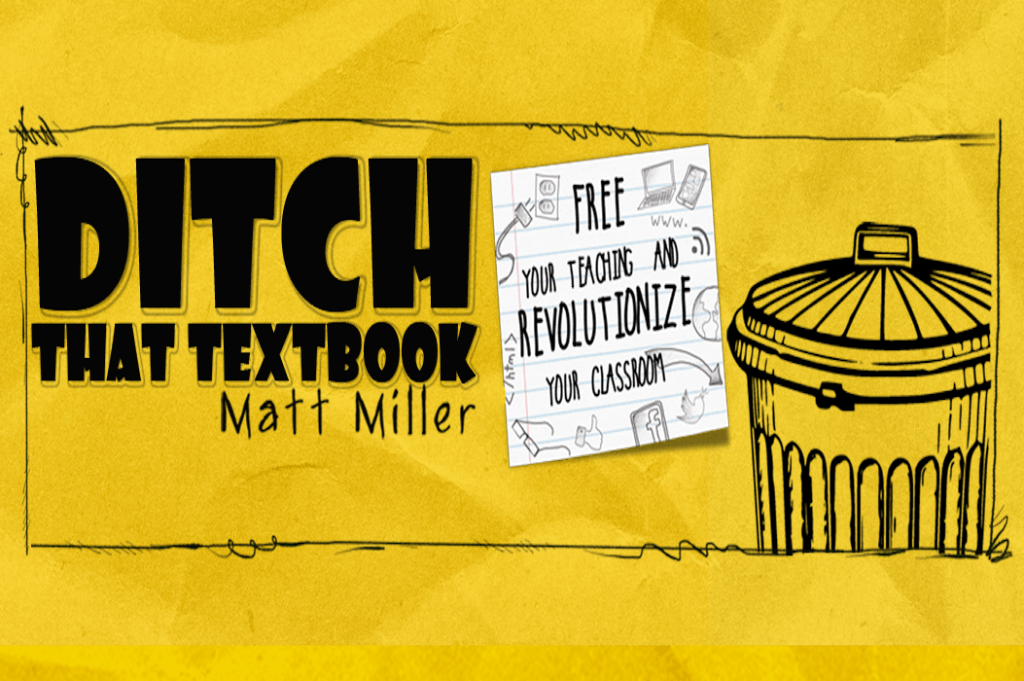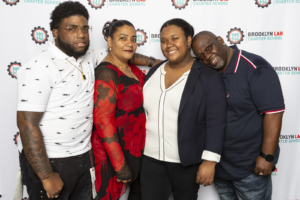Q&A with Author, Educator Matt Miller on ‘Ditch That Textbook’ and ‘Ditch That Homework”

When we discuss how to improve teaching and learning, we are often looking at things to add to our collective tool belts. Whether it’s technology, resources, protocols, or instructional approaches, it’s usually about doing something new or additional. Well, author and educational leader Matt Miller has made a career promoting taking things away in order to improve learning. His first book, Ditch That Textbook, as well as his second book Ditch That Homework, have become foundational for those looking to liberate themselves from the constraints of single-source, scripted teaching models and uninspired take-home assignments. In these books, Miller challenges teachers to reflect on their current practice and find better ways to make a difference in the lives of their students. ‘DITCH’ is an acronym for Different, Innovative, Tech-laden, Creative, and Hands-on. Recently, Miller responded to questions about the book and the work that it has prompted.
Getting Smart: Since publishing the book, how has education changed? Not changed? Has the idea of deeper learning through abandoning the textbook exceeded your expectations?
Miller: When I started my blog and wrote the book, I was sharing my own teaching experiences where I discovered the freedom of not just following the textbook. First, there are lots of other textbook ditchers that came long before me. That’s been a huge encouragement! I’m so inspired by all of the educators I’ve met that we’re doing this before technology became so ubiquitous and easy to use. Secondly, I was reminded that education is slow-moving. As much as I have tried to help equip and empower teachers to do things differently, the law of inertia still applies. However, I have seen lots of encouraging movement in the right direction!
How can the idea of being fully liberated from the textbook be realized?
I think in some ways the textbook can be a great resource. And if we think of it as a resource – not as the sole source of our curriculum – it can still be very useful. I have found that it sometimes provides a great structure for newer teachers. And in some subjects like literature, it provides access to materials that students need to read. But when we have a grasp on what we want to teach and what we want students to learn, then we become best equipped to provide that custom-created learning environment for our students. We know the unique needs of our students. We know our material intimately. And we know the connections that we can make between our students and that material. When that happens, we can create this perfectly designed learning pathway that a traditional textbook just can’t do. We know what we are trying to accomplish and we can do it ourselves. That’s when true liberation can really start to blossom.
With the amazing quantity and quality of resources available online – often for free – why don’t all educators embrace the ideas of teaching from diverse sources?
This is a question that I have wrestled with a lot myself. The fact that we have almost unlimited resources can be very empowering, but also crippling at the same time. It’s so easy to become overwhelmed with the vast array of resources. There’s no way for us to see everything and evaluate what’s best. So, as a defense mechanism, I think many times we just stick to what we’ve already got. It’s easier to continue to teach from a textbook that we’re familiar with than research and vet and choose from all of the sources that are out there. Plus, digital literacy plays into this as well. How do we know that these sources are accurate or high quality? Since teachers typically have so little time and are asked to do so much, sometimes sticking to what we’ve always done is the way that we cope. For anyone who supports educators, one thing they can do to empower them is to give them time to make that vetting process easier.
Where do you see deeper learning, project-based learning, or more textbook- independent learning happening? Who is doing this? Leading it?
Sadly, I suspect that the ones who are doing the greatest work in this textbook- independent learning are the ones who do it successfully in their classrooms and don’t share it. This, however, is not a knock on their lack of sharing. It’s an encouragement to me whenever I see educators who are doing this great, innovative teaching and learning in their classrooms. The people who have the biggest platforms and voices on social media aren’t necessarily the ones who are doing the most innovative work. Unfortunately, the loudest voices aren’t always the ones who are doing the work and pushing the change. I’m always thrilled to feature innovative, forward-thinking educators as guest bloggers on my blog, and through different channels, I have to reach other educators. There’s some really fantastic innovative work being all over the world and I always feel inspired when I interact with educators anywhere.
What are a couple of immediate things teachers could do to implement these philosophies and notice an immediate impact on their students?
When you have your focus point in mind and start to develop a vision for what it looks like, there are a few things that can empower teachers to get started. One is to start small. Many times, it’s easy to get overwhelmed with a great big vision of what you want to change. I believe that the easiest way to start change is to have small successes. I always encourage teachers to find something that makes them say, “I can do this.” It’s all about confidence again. When they have that small success, it gives them momentum and confidence to try the next thing. Momentum is powerful. Another thing that can drive change with your chosen focus is to keep your eye on the results. Results don’t have to be grades in a grade book or standardized test scores. We can choose the results that we want to monitor. We can choose results based on criteria that we know demonstrates success in whatever area we want to measure. When we see that something is succeeding because it shows results, that gives us confidence. But it also goes a long way to convince parents, administration, the community, and whomever else we need to convince.
How did ‘DITCH THAT HOMEWORK’ come about as the next iteration after ‘Ditch That Textbook’?
Honestly, this was a passion project for me and my co-author Alice Keeler. For both of us, we had seen so many concerns about inequities and inefficiencies in homework and how it was wrecking families and relationships. The more we talked to other people and dove into the research, the more concerns we had. We didn’t want to fight the battle of whether homework should be assigned. Instead, we wanted to provide some practical ideas for teachers who wanted to see what could be done instead. That’s what ‘Ditch That Homework’ is all about — answering the question of what we can do if traditional homework isn’t getting us the results that we want.
What are the pitfalls and problems with homework?
For one, I don’t think that many educators get the results out of homework that they anticipate. I think many times we look at homework through rose-colored glasses. We assume that we will get extra quality repetitions outside of the classroom by assigning homework. The reality is that those homework assignments don’t provide great results. And in many cases, they create detrimental circumstances that can actually work against what we want to accomplish in education. Students often try to complete homework assignments in environments that won’t really lead to solid learning. Sadly, the assignments aren’t often designed to provide that kind of learning. Many times, students who could benefit from the homework are the ones who either won’t do it or will copy someone else’s answers just to get the points. And the students who don’t really need the homework are the ones who end up completing it, which unfairly inflates their grades over the ones who are struggling.
We haven’t even touched on the equity issues here. When we ask families to become surrogate teachers and help children complete assignments, we create an inequitable situation, especially for families whose parents don’t have high levels of education. The discussion of concerns around homework are so broad and deep. The more I look at them and the more that I talk to parents, the more I question whether students are better off doing homework.
There seems to be more of a recent pushback on homework, especially amongst parents of younger learners. What are your thoughts?
I have read lots of writing and research about the value of play in the learning of younger students. When we encourage students to do mindless repetition drills at home, it starts to steer away from that. That’s a big concern for me. When students come into early grades, there’s still a sense of joy around learning. When we snuff out that joy by making learning a chore, we start to kill this momentum that we have going that will propel students to become quality learners throughout their lives. And many times, it’s in pursuit of standardized test scores and short-term gains. We are really cutting off our nose to spite our face.
How do you think we can get all stakeholders – teachers, leaders, parents, board members, community and event students – on the same page about how we define learning and what school should be about?
I think this issue is all about vision. Many times, school leaders cast a vision of what’s important to them but it doesn’t reflect the vision of the families they serve. If we want to get everyone on the same page about what learning should look like, it should reflect the needs of the community. That’s one thing that I love about the way education is done in the United States. It’s so locally-driven. States have a big say in how school is run, but local school boards, individual school districts, and individual schools have even more of a say. The federal government doesn’t drive very much of it. This gives local schools and districts the nimbleness they need to make change that reflects what their community wants. Sadly, I think many times we squander that great advantage. We don’t create something that is unique and specifically tailored to what our communities want. Many times, I think it should begin and end with serving the needs of the communities. When families feel like the education in schools is a reflection of what they value, they rally behind it. There’s a perception that the schools are giving their children what they need to succeed. And in the end, everyone ends up working together toward that goal.
What’s next for you? Where is this work going to take you?
I’m fortunate that I get to spend my life supporting and empowering teachers. I love highlighting the great work that’s being done by teachers in the classroom. I love providing resources that equip teachers to try new ideas without having to invest significant time and money. To do that, I will continue to keep an eye and a foot in the classroom however I can. I’m also actively looking for ways to lift up and amplify the voices of those doing the work in the classroom, especially teachers of color and in marginalized groups. I love being able to do that through my annual free online conference Ditch Summit, through my blog, and through other channels.
For more, see:
- Instruction-Driven Scheduling: Using Time as a Powerful Resource
- Integrated Curriculum: Why it Matters, and Where to Find It
- Why We Need a Moratorium on Meaningless Note-Taking
Stay in-the-know with innovations in learning by signing up for the weekly Smart Update.







0 Comments
Leave a Comment
Your email address will not be published. All fields are required.